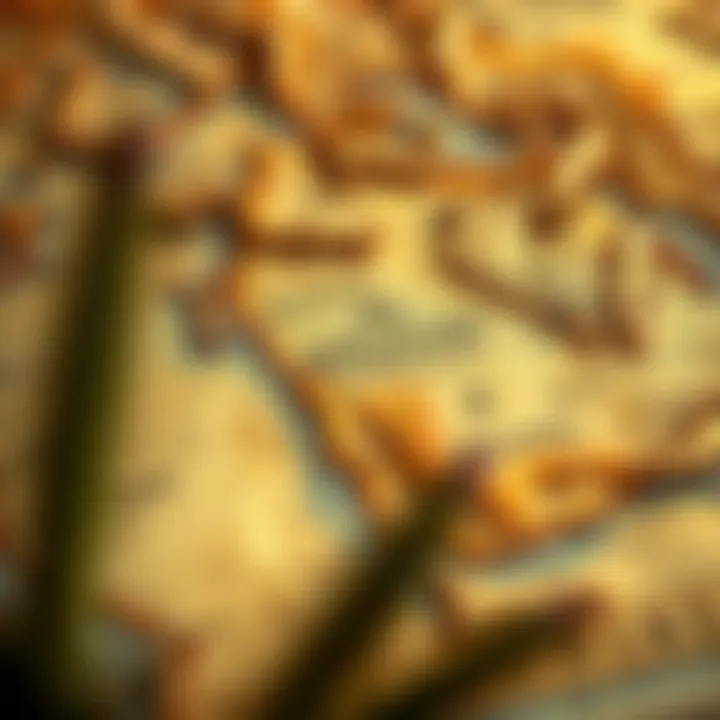The Legacy of Abu Al-Fida Al-Khalidi Explored


Intro
The journey into the realms of geography and literature often takes unexpected turns. One such turn leads to the life and work of Abu Al-Fida Al-Khalidi. As we peel back layers of history, we uncover a tapestry rich with cultural, social, and political significance. In an era marked by turmoil and transformation, Al-Khalidi emerges as a beacon of intellectual pursuit. Born in the early 14th century, his contributions resonate to this day, illuminating aspects of Arab history that continue to shape identities and narratives in contemporary scholarship.
Abu Al-Fida Al-Khalidi's insights were not merely academic; they were deeply intertwined with the sociopolitical fabric of his time. His geographical texts served as vital resources, setting the stage for future exploration and understanding of the world. Moreover, his literary contributions reflect the complexities of human experience and the intricacies of identity. Through his works, a panoramic view of the Arab world unfolds—one that is essential for scholars, historians, and those keen on comprehending the depth of cultural legacies.
In the following sections, we will navigate the winding paths of Al-Khalidi's legacy. From the contextual backdrop of his life to the lasting marks he has left on modern thought, this discourse aims to provide a comprehensive understanding.
Thus begins our exploration into how Al-Khalidi's influence extends beyond his centuries, into the very heart of contemporary scholarship and cultural reflection.
Prelims to Abu Al-Fida Al-Khalidi
In exploring the legacy of Abu Al-Fida Al-Khalidi, one must grasp that this figure wasn't merely a product of his environment but an architect of knowledge whose influence transcends the simplicity of time and geography. His contributions were not just academic; they delineate the very contours of Arab identity, enriching it with critical perspectives that continue to echo in present-day discourse.
Who Was Abu Al-Fida Al-Khalidi?
Abu Al-Fida Al-Khalidi was a multi-faceted intellectual born in 1273 in the region known today as Syria. He stood out in the medieval landscape for his dual prowess in geography and literature—two disciplines that often went hand in hand during his era. Most notably, he is celebrated for his book "The Book of Geography," which includes both his cartographic work and insights into the cultures and peoples of his time. This compilation went beyond maps; it provided a lens through which the medieval viewer could navigate the intricacies of their world.
Scholars often refer to Al-Khalidi as a crucial figure in Arabic historiography. He didn’t just record events and locations; he critiqued and analyzed them, shaping historical records that informed future generations. His ability to intertwine factual recounting with literary elegance set a precedent that many writers and historians sought to emulate.
Historical Context of His Life
Understanding the historical context of Al-Khalidi’s life is essential to appreciate his contributions fully. The late 13th century and early 14th centuries, when he lived, were rife with sociopolitical upheaval. The Mamluk Sultanate was at its zenith, and the region was marked by both advances and conflicts. Amidst this backdrop, Al-Khalidi emerged as not merely an observer but as a commentator on the seismic shifts of his world.
His writings reflect more than mere geographical data; they illuminate the societies under changing power structures, the cultural intertwining prompted by trade, and the pivotal role that geography played in shaping these power dynamics. Al-Khalidi’s inquiries were informed by, and served as a commentary on, the political strife and cultural syncretism that characterized his times. This context enriches our understanding of his work, underscoring its relevance in both historical and contemporary scholarship.
Contributions to Geography
The contributions of Abu Al-Fida Al-Khalidi to the field of geography are not merely an academic footnote but rather a profound element in the evolution of geographic understanding. Al-Khalidi’s work bridged the gap between previous knowledge and emerging needs for systematic exploration and documentation of the world. It’s crucial to recognize that his maps and geographic writings were not simple illustrations; they formed the backbone of future geographical inquiry in the Arab world and beyond.
His work provided significant insights into the natural landscape, which is essential for various stakeholders today, including investors looking for potential opportunities based on geographic data, homeowners wanting to understand regional layouts, and expatriates needing to navigate new environments effectively. Al-Khalidi’s geographical approach was meticulous and grounded in both observation and the collection of empirical data, which added a layer of credibility and rigor to his studies that was often missing in earlier works.
Geographical Works and Methodology
In examining the geographical works of Al-Khalidi, one cannot overlook his unique methodology. Al-Khalidi favored systematic observation, which he combined with an extensive examination of earlier scholars’ works. Instead of relying solely on classical texts, which often contained inaccuracies and assumptions, he sought to offer a clear representation of the territories he studied.
- Systematic Classification: Al-Khalidi classified geographic features based on various criteria, such as climate, topography, and human settlements. This was groundbreaking for his time and provided a structured way for others to approach geography.
- Empirical Observations: His journeys across different regions led him to document firsthand observations, which he meticulously recorded. This focus on empirical evidence laid the groundwork for a more scientific approach to geography in the Islamic world.
- Integration of Knowledge: He was adept at integrating knowledge from various domains, including astronomy and cartography, making his works multifaceted. This holistic approach allowed him to create more comprehensive maps and texts.
Abu Al-Fida’s maps are not merely artistic or decorative; they serve as precise tools that reflect the world as he saw it. Relying on detailed notes from his travels, coupled with consultations of earlier geographic literature, he crafted works that continue to be relevant, even in modern geographic discourse.
Significance of His Maps
The significance of Al-Khalidi’s maps extends beyond historical curiosity; they have practical applications and enduring relevance in contemporary geography. His maps documented not just physical landscapes, but also cultural and political dynamics, offering insights that are invaluable to today’s global society.
"Al-Khalidi’s maps serve as historical documents, reflecting the wealth of knowledge and understanding of the world during his time, which is critical for today’s scholars and professionals alike."
- Cultural Context: His maps were infused with cultural narratives that provided context. For instance, they did not merely indicate the location of mountains or rivers but often included information about the various peoples and cultures inhabiting those areas.
- Political Boundaries: Al-Khalidi was also keenly aware of the political landscapes of his time. His maps illustrated contemporary borders and highlighted significant cities and trade routes, making them a vital resource for understanding historical political dynamics.
- Reference for Future Generations: Scholars and geographers post-Al-Khalidi built on his work, using his maps as foundational references. This lineage ensures that his contributions transcend his lifetime, laying a robust groundwork for those who followed.
In summary, Abu Al-Fida Al-Khalidi's contributions to geography represent a rich tapestry of observational skill, methodological rigor, and a deep understanding of the cultural and political landscapes of his era. His maps and writings not only influenced his contemporaries but also continue to guide and inform contemporary discourse on geography.
Literary Contributions
Abu Al-Fida Al-Khalidi's literary contributions stand as a testament to his intellectual prowess and creativity. His writings were not just mere reflections of his thoughts; they shaped the landscape of Arabic literature and set a benchmark for future generations. Among the myriad reasons for the importance of his contributions lies the innovative themes and styles that he pioneered, which continue to resonate with modern writers and scholars.
Influential Texts and Themes
Among his range of works, Al-Khalidi's historical narratives and geographic treatises are particularly noteworthy. His "The Book of the Cities and Their Historical Events" laid the groundwork for combining geographic data with historical context, a theme that would influence many authors thereafter. In his narratives, he adeptly intertwined personal observations with broader socio-political themes, showcasing how the changing landscape could affect the destinies of people. Through such writings, Al-Khalidi effectively articulated the connection between geography and history, emphasizing that the very nature of a place could shape its people's cultures and stories.
One prominent theme in his work remains the struggle for identity within a rapidly changing world. This is reflected in the way he chronicled the events of his era. He did not shy away from addressing turbulent political climates or social upheavals, presenting a candid view of life during times of strife. His ability to bring forth these themes allowed readers to grapple with their realities, of then and now. This aspect makes his writing not just historically significant, but also relevant in today’s context, where issues of identity and belonging continue to dominate discussions.


Style and Innovations in Literature
Al-Khalidi’s style is another pillar of his literary legacy. He seamlessly blended informative content with narrative artistry, employing a clear yet engaging prose style. His writing exhibits a remarkable fluidity, making complex topics accessible while maintaining depth. Moreover, he often adopted a first-person perspective, which lent an intimate feel to his narratives, drawing readers into the intricacies of historical events as though they were firsthand witnesses.
In terms of innovation, one could argue that Al-Khalidi was a pioneer in utilizing storytelling techniques in non-fiction literature. By enriching his historical accounts with relational anecdotes and engaging descriptions, he opened doors for future historians and writers to explore the emotive aspects behind events rather than presenting mere data.
"The couch of literature, when aligned with the essence of history, becomes a powerful tool for cultural preservation."
His contributions to language were significant as well. He employed metaphors and allegories to contextualize his observations, making his texts not only informative but also thought-provoking. This literary flair played a crucial role in cementing his works as timeless pieces in the annals of Arabic literature.
In summary, the literary contributions of Abu Al-Fida Al-Khalidi embody a unique fusion of historical insight and creative expression. His texts and themes reflect the nuances of Arab identity while pushing literary boundaries, enriching cultural dialogues. For scholars, readers, and enthusiasts, Al-Khalidi's works continue to serve as a rich source of inspiration and study, bridging the past and present in an evocative narrative that is both engaging and insightful.
Abu Al-Fida Al-Khalidi’s Role in Historical Documentation
Abu Al-Fida Al-Khalidi stands out as a pivotal figure in the realm of historical documentation during his time. His extensive writings not only provided insight into the socio-political dynamics of his era but also offered a framework for future historians. Al-Khalidi’s meticulous approach to chronicle events, combined with his unique perspective, has inspired generations of scholars to reassess the art of historical record-keeping. This section highlights key elements of his contributions and the benefits of his historical documentation methodology.
A significant aspect of Al-Khalidi’s work is his ability to synthesize information from diverse sources, enhancing the reliability of his accounts. He distanced himself from mere anecdote, striving instead for a narrative that resonates with both rigor and human experience. This fusion of narrative and analysis has elevated his status among historians and makes his work relevant even today.
Chronicling Events of His Era
In examining Al-Khalidi’s chronicles, one cannot overlook his immersion in the events shaping his world. His writings reflect a keen awareness of the intricate web of politics, culture, and religion that characterized the medieval Arab landscape.
For example, the "History of the Kings of Syria and the Holy Land" showcases his adeptness in capturing not just the political upheavals, but also the daily lives of people in those tumultuous times. Al-Khalidi made it a point to juxtapose significant battles with societal shifts, effectively illustrating the far-reaching impacts of politics on culture.
- Detail-Oriented Approach: Al-Khalidi’s focus on specific dates, locations, and figures allows modern readers to trace back through history with a sense of precision.
- Cultural Relevance: He often embedded cultural tales and local folklore into his historical context, providing a broader lens through which to view events.
- Comparative Lens: Al-Khalidi frequently compared different rulers and their strategies, offering insights into the nuances of leadership and governance.
"History is like a river, flowing through the land, carrying tales across time — Abu Al-Fida Al-Khalidi captured that flow with precision."
This illustrative quality not only enhances the readability of his texts but also stresses the significance of historical context in understanding the present.
Comparison with Contemporary Historians
When placed alongside his contemporaries, Al-Khalidi’s style emerges as distinctive for its thoroughness and narrative quality. He often contended with historians who favored poeticism or moralistic interpretations, taking a more pragmatic stance that focused on factual reporting combined with analytical discourse.
- Contrast with Ibn Khaldun: While Ibn Khaldun emphasized the philosophy of history within a socio-economic framework, Al-Khalidi concentrated on factual recounting, lending him a different type of credibility.
- Diversity in Sources: Al-Khalidi’s use of diverse sources, including oral traditions and written records, marks a significant departure from the reliance on singular narratives that some of his contemporaries showcased.
- Record of the Common People: Unlike many historians who primarily documented the lives of nobility, Al-Khalidi frequently highlighted the experiences of common folk, adding layers of depth to his historical accounts.
While his contemporaries may have painted the grand strokes, Al-Khalidi filled in the details that make history vibrant and relatable. This distinction enriches the contemporary understanding of historical methodologies and highlights Al-Khalidi’s role as a foundational figure in the historiography of the Arab world.
In summary, Al-Khalidi’s role in historical documentation has left a lasting imprint on the discipline. His relentless pursuit for a comprehensive account of events empowers modern historians to approach their craft with a renewed commitment to detail and a heightened awareness of the past’s complexities.
Cultural Impact and Legacy
Abu Al-Fida Al-Khalidi's contributions extend beyond mere historical documentation; they delve deep into the cultural fabric of Arab identity and heritage. His works resonate in today’s scholarly discussions, reflecting the syncretism of knowledge that characterized his era. Understanding this cultural impact enriches not only our comprehension of Al-Khalidi's life but also the ways in which his legacy shapes contemporary discourse.
Influence on Arab Identity
Al-Khalidi’s writings serve as pivotal reference points for understanding Arab cultural identity in the face of historical upheavals. By chronicling geographical and historical detail with precision, he helped to cement the historical consciousness of the Arab people. His mapping and historical narratives fostered a sense of unity, an appreciation of shared cultural heritage among diverse communities within the Arab world.
This is particularly evident in the way his geographical studies pay homage to the rich, historical narratives of various regions. They paint a picture of spaces that are not just locations on a map, but are imbued with stories that speak about the people, traditions, and changes over time.
"The past is not dead; it is living in us, and even in the most modern of findings, one can trace its roots back to scholars like Al-Khalidi."
Reception in Modern Scholarship
In recent decades, scholarly interest in Abu Al-Fida Al-Khalidi has soared, his works being reexamined within modern contexts. Researchers are looking at how his historical and geographical analyses inform current understanding of Arab identity, geopolitical changes, and even issues of cultural heritage. Many academics appreciate how Al-Khalidi’s meticulous nature aligns with modern methodological standards, highlighting his role as a forefather in historical geography.
His influence is not merely of historical interest; it’s actively shaping a new generation of scholars who recognize that learning from the past informs better approaches to contemporary challenges. His works are increasingly referenced in contemporary studies focused on the Arab world's cultural and geographical complexities. The serious reconsideration of his contributions signifies a broadening of perspectives in modern scholarship, insisting that the past must not be overlooked in our efforts to understand the present and future.
As the relevance of Al-Khalidi’s sustainability within academic discussions indicates, his legacy will continue inspiring those who strive to intertwine historical insights with modern realities. The intricate tapestry of Arab identity and culture, which Al-Khalidi depicted with diligence, serves as a reminder that understanding one's roots is crucial for progress.


This revitalization in appreciation reveals a renewed recognition of the intersections between geography, literature, and identity, reminding all of us that the scholarly treasure troves of our past hold immense value in navigating the complexities of the modern age.
Challenges and Critiques
Debates on Historical Accuracy
Abu Al-Fida Al-Khalidi's work is not without its nooks and crannies that scholars have been eager to examine. The matter of historical accuracy rests heavily on the shoulders of not just Al-Khalidi but on the pressing socio-political conditions during his time. For instance, records from his era often reflect biases shaped by regional affiliations, religion, and personal agendas, casting a shadow over the authenticity of certain accounts. Critics often engage in fiery debates regarding the weight of his narratives versus the objective truth they attempt to document.
Some argue that Al-Khalidi's representations of geographical spaces may have undergone embellishments, a common issue faced by many historians of his time who sought to serve patrons or to glorify local heroes. This raises the fundamental question: to what extent do local narratives color the broader strokes of history?
Consider the case of his chronicles on the wars fought in various regions. Some historians believe that sensational tales were embedded in his accounts, leading to discrepancies between events as they unfolded and how they were remembered. Thus, his history is, in some ways, a mirror reflecting the realities of power struggles, alliances, and conflicts that defined his era.
The debates surrounding Al-Khalidi's work also revolve around how his methodologies influenced narrative structures. Critics argue that while he was certainly influential in merging personal observation with scholarly rigor, certain gaps still seep through the seams when cross-referenced with other contemporary sources. In the quest for historical truth, one must tread carefully, as the interpretation of Al-Khalidi’s writings can often be as diverse as the voices that echo them.
Influence of Political Context
Political contexts are vital in deciphering not just Al-Khalidi's chronicles but the general landscape of historiography in his day. The political currents sweeping through his homeland often influenced much of what was documented, sometimes steering the ship of history away from objective recounting into the murky waters of propaganda.
The loyalties that must have tugged at Al-Khalidi's pen are difficult to ignore. Rulers and empires routinely influenced historians through patronage, pressure, or ideological alignment. These influences can be seen in the selective representation of events and figures who are either glorified or vilified. For example, when tracing the rise and fall of dynasties, one cannot escape the feeling that historical works tend to reflect the aspirations or grievances of the time, tweaking facts to serve a narrative that echoes with the ruling class.
Moreover, contemporary historians often wrestle with the shadows cast by political bias embedded within historical texts by Al-Khalidi. The challenge lies in deciphering his work through layers of political influence, seeking truths that might otherwise be obscured. Unpacking these influences requires a critical eye; readers comparing his work against other records must ask how the prevailing political structure affected Al-Khalidi’s perspective and therefore the value of his scholarship in today’s context.
"A historian's duty is to navigate through the fog of bias to bring forth the clearest possible view of the past, but even when the sun shines, shadows still unfold."
For more comprehensive insights into historical accuracy in historiography, you might refer to Wikipedia or involve yourself with scholarly discussions on Britannica.
Further, exploring resources such as reddit.com/r/history can offer diverse viewpoints and lively debates on these compelling subjects.
Impact on Later Scholars
Abu Al-Fida Al-Khalidi has left a profound and lasting mark on later scholars, not just within his immediate academic circle but across the broader landscape of historical research and literary analysis. His pioneering methodologies, geographical insights, and literary styles serve as both an inspiration and a foundation for subsequent generations of scholars who look to continue his legacy.
Mentorship and Influence
The sphere of mentorship often creates a ripple effect. Al-Khalidi’s approach to teaching and sharing knowledge is pivotal in influencing scholars beyond his time. Many future historians and geographers drew from his works, utilizing his methodologies in their research. He emphasized rigorous observation and documentation; this advocacy for meticulous scholarship nurtured a generation of scholars who recognized the importance of evidence-based research.
Notably, Al-Khalidi’s geographical texts fostered an environment where intellectual inquiry thrived. Those who encountered his work in academic settings often found themselves deeply stirred to explore their own paths in research. He challenged his students to not merely accept historical narratives but to question and investigate the unseen layers beneath those accounts. This habit of inquiry, instilled early on, became a hallmark of later academic pursuits.
"To understand history is to dig beneath the surface; Al-Khalidi taught us to use spades, not just to skim the top."
Foundations for Future Research
Abu Al-Fida Al-Khalidi's contributions established a robust framework for future research in geography and historical documentation. His maps and narratives not only provided invaluable insights into the geographical configurations of his time but also set standards in historical fidelity and narrative clarity.
- Geographical Methodology: Later scholars adopted Al-Khalidi’s methods of combining geographic data with historical context. His unique approach allows researchers today to reconcile ancient geographic information with modern understandings. For instance, his detailed maps enhance the studies of shifting geographical boundaries in the Arab world, illuminating historical events with a spatial perspective.
- Historical Narrative: His literary style has influenced many a historian in how they frame their narratives. With a keen eye for detail and a talent for storytelling, his works encouraged an integration of anecdotes with factual information. Scholars today often find themselves inspired by his techniques to weave more engaging and informative narratives, making them more accessible and compelling to modern audiences.
- Interdisciplinary Research: Al-Khalidi's work underscores the importance of merging various fields of study. Geography, history, and literature often converge in his writings, demonstrating to future researchers the value of interdisciplinary approaches in crafting well-rounded scholarly perspectives.
In summary, Abu Al-Fida Al-Khalidi not only advanced the fields of geography and literature but entrenched principles and practices that continue to guide scholars today. His emphasis on rigorous analysis and narrative depth inspires a tradition of critical scholarly inquiry that echoes through modern academic endeavors.
Contemporary Relevance of Al-Khalidi’s Work
Abu Al-Fida Al-Khalidi's presence in the annals of history is not merely a tale of bygone days; it resonates even in today’s world. His ability to intertwine geographical accuracy with literary elegance provides significant insights for contemporary audiences. The relevance of his work lies not just in historical appreciation but also in how it shapes various modern disciplines. In this segment, we dive into how Al-Khalidi's contributions are vital for current scholarship and society.
Intersection with Modern Geography
In the realm of geography, Al-Khalidi's methodologies strike a chord with today’s practices. He combined rigorous observation with detailed mapping, offering a framework that many modern geographers still find useful. His work highlights the importance of empirical evidence in geographic studies, urging scholars to blend observation with technology.
- Core Methodologies: Al-Khalidi relied on firsthand experiences and meticulous note-taking, which casts a long shadow over contemporary geographic research.
- Technology Interface: Today’s geographers utilize advanced technologies like GIS, but the foundational principles set by Al-Khalidi remain relevant, emphasizing field research and local knowledge.
His geographical works not only charted spaces but also explored the human interactions within them, making his insights crucial for urban and rural planning endeavors today.


"If we are to look back and learn, it is essential we revisit those who masterfully shaped what we now know. Al-Khalidi’s maps are not antiquities; they are blueprints for our future."
Literary Modernism and Its Roots
Exploring Al-Khalidi's literary contributions sheds light on the evolution of modern literary forms. His creativity drew from a mélange of cultural influences, embodying the spirit of a scholar whose works transcend their time. His narrative style, with rich descriptions and layered meanings, paved the way for literary modernism in the Arab world.
In the discussion of literary modernism, several ideas are notable:
- Cultural Fusion: Al-Khalidi’s works reflect a blend of traditional Arabic storytelling with emerging modern ideas. This cultural fusion is mirrored in contemporary literature.
- Themes of Identity: His exploration of identity and place has become a theme in modern writing, resonating with the perennial questions of belonging and history in today’s texts.
- Language Evolution: The linguistic choices made by Al-Khalidi indicate a shift towards more accessible language in literature, a trend that modern writers continue to embrace and adapt.
Through these perspectives, Al-Khalidi's relevance extends beyond mere acknowledgment as a historical figure; he forms a bridging point to current scholarship and creative thought, highlighting how past works can inform present academic and artistic endeavors.
Preservation of Histories
The preservation of histories is a cornerstone in understanding the evolution of societies and cultures. In the case of Abu Al-Fida Al-Khalidi, his contributions to the archival landscape are crucial. Not only do they serve as a bridge linking past and present, but they also offer insight into the complexities of the times he lived in. The scarcity of written records from various eras can lead to significant gaps in knowledge. Consequently, preserving historians' works like Al-Khalidi's ensures future generations have access to a rich tapestry of narratives that reflect diverse perspectives.
One might argue that preserving histories, particularly those of notable figures, is essential for several reasons:
- Cultural Identity: The historical records authored by Abu Al-Fida Al-Khalidi contribute significantly to the formation of cultural identity. They allow communities to grasp their roots and how their past shaped present identities.
- Academic Value: Historians and scholars continue to reference Al-Khalidi’s works, establishing a foundation for academic discourse in the fields of geography and literature. This interplay highlights how contemporary scholarship benefits from historical insights.
- Awareness of Change: By viewing the past through Al-Khalidi’s lenses, we can understand how certain social and political dynamics evolved over time. His records serve as a lesson of continuity and change, providing context for current events.
"The preservation of histories not only reflects the echoes of past voices but also shapes the pathways for future discussions."
Thus, the role of Abu Al-Fida Al-Khalidi’s writings cannot be understated—they represent an essential thread in the fabric of historical narrative, encouraging a continual dialogue that transcends generations.
Archiving Al-Khalidi’s Works
Archiving Al-Khalidi’s works is a delicate task but essential for maintaining the integrity of his contributions. His texts are housed in various institutions, some have dedicated efforts to digitizing his geographical maps and literary works. Efforts to create seamless access to this knowledge allow historians, students, and the general public to explore his narratives in their entirety.
There are specific measures that institutions can undertake for effective archiving:
- Digitization: Converting texts and maps into digital formats ensures that they're safeguarded against deterioration, making them available to audiences worldwide. Online platforms often have specific archival projects aimed at preserving historic documents, such as the Digital Public Library of America and the World Digital Library.
- Restoration: Old texts may need careful preservation or restoration. By employing trained professionals to restore damaged manuscripts, physical copies can be maintained for future scholars to study firsthand.
- Public Accessibility: By ensuring that Al-Khalidi's works are searchable and accessible online, institutions can democratize knowledge. Hosting various programs and workshops can engage a broader audience, fostering a richer understanding of his contributions.
Role of Institutions in Historiography
The role of institutions in preserving and promoting historiographical works like those of Al-Khalidi is multifaceted. They not only safeguard these texts but also actively contribute to the scholarship surrounding them. Libraries, universities, and museums typically take up the mantle of ensuring that historical contexts are maintained and understood within contemporary frameworks.
Institutions can enhance the impact of Al-Khalidi’s work through:
- Collaborative Research: By supporting collaborative research initiatives, scholars from different disciplines can come together, fostering interdisciplinary dialogues. This brings new insights into Al-Khalidi's significance in literature and geography, ensuring a well-rounded understanding of his impact.
- Educational Outreach: Initiatives that involve teaching Al-Khalidi’s work in schools and universities can combine traditional and modern pedagogical methods. Workshops and seminars can encourage students to apply his methodologies and insights into current geographical practices and literary analysis.
- Conferences and Publications: Hosting conferences that focus on Al-Khalidi’s contributions, while encouraging the publication of research papers, allows for a deeper exploration of his legacy and ensures that scholars engage critically with his works.
In summary, the effort to preserve histories like that of Abu Al-Fida Al-Khalidi holds invaluable benefits, not just for immediate academic circles, but for cultural understanding on a global scale. Institutions play a vital part in facilitating connections with past narratives, propelling forward the legacy they carry.
Finale
The conclusion serves as a crucial element in understanding the extensive impact of Abu Al-Fida Al-Khalidi. It offers a final opportunity to reflect on how his monumental contributions to geography and literature not only shaped his contemporaneous society but also resonate in the modern era. By synthesizing the various aspects of his life and work, readers can grasp a multifaceted perspective on his legacy, pushing boundaries in both scholarship and cultural identity.
Summation of Al-Khalidi’s Contributions
Al-Khalidi's works stand as a testament to the power of knowledge that transcends time. His geographical writings provide a detailed understanding of the Arab world during his lifetime, marked by meticulous observations and methodological rigor. Not only did he enrich the field of geography, but he also served as a chronicler of historical events, making his historical accounts invaluable.
Through texts like The History of the Kings of Syria, Al-Khalidi employed narrative techniques that brought history alive. The themes of his literature reflect the rich tapestry of Arab culture, melding facts and narratives to create a compelling story. His ability to blend personal insight with factual history offers scholars a unique lens through which to examine both the past and its implications for the present.
A Look Forward: Relevance in Future Scholarship
Looking ahead, Al-Khalidi’s work prompts further exploration in both geography and literature. His methodologies can inspire contemporary researchers who seek to bridge gaps between different academic fields. In geography, for instance, his approach to understanding landscapes and socio-political contexts can inform today’s discussions around environmental issues and urban planning.
Moreover, his literary innovations contribute to ongoing dialogues about modernism and narrative structure in historical writing. As scholars dig deeper, they may find his techniques applicable to analyze contemporary issues in Arab identity and cultural expressions. The potential for interdisciplinary approaches based on Al-Khalidi’s legacy seems promising, allowing future generations to cultivate a rich understanding of the intricate dynamics between history, geography, and literature.
Al-Khalidi’s influence is enduring, and by acknowledging his contributions, we not only celebrate his genius but also pave the way for a more nuanced understanding of our cultural and historical landscapes.
"In every great achievement lies the legacy of those who came before us, shaping the paths of inquiry and understanding."
Suggested Further Reading
- Wikipedia on Abu Al-Fida Al-Khalidi
- Britannica entries on Arab History and Literature
- Discussion on Reddit about the Impact of Historical Figures
- Research papers from Academic Google
The legacy of Abu Al-Fida Al-Khalidi continues to inspire scholars and academics, encouraging them to ponder how past ideologies can influence both contemporary thought and future inquiry.











